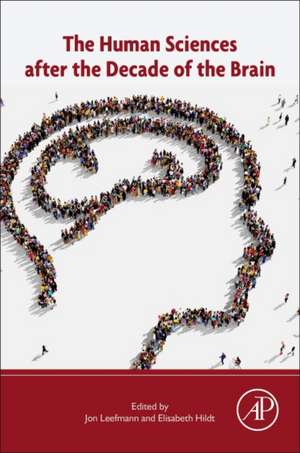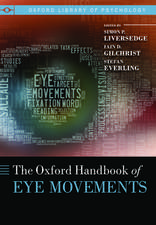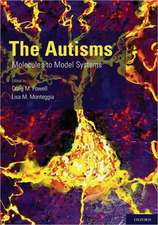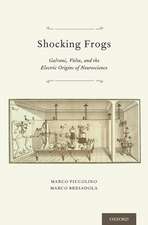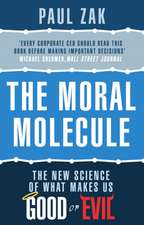The Human Sciences after the Decade of the Brain
Editat de Jon Leefmann, Elisabeth Hildten Limba Engleză Paperback – 13 feb 2017
This book is an important resource both for students and scholars of cognitive neuroscience and biological psychology interested in the philosophical, ethical, and societal influences of—and on—their work as well as for students and scholars from the social sciences and humanities interested in neuroscience.
- Explores the recent influence of neuroscience on the humanities and social sciences and how they respond to these influences
- Offers in-depth analysis of the theoretical and practical influence of a brain-centered scientific view in diverse areas of the social sciences including economics, education, cultural studies, and philosophy
- Investigates contributions of the history of science to scrutinizing current neuroscience–based approaches to social and moral behavior
Preț: 353.40 lei
Preț vechi: 454.71 lei
-22% Nou
Puncte Express: 530
Preț estimativ în valută:
67.62€ • 70.79$ • 55.95£
67.62€ • 70.79$ • 55.95£
Carte tipărită la comandă
Livrare economică 29 martie-12 aprilie
Preluare comenzi: 021 569.72.76
Specificații
ISBN-13: 9780128042052
ISBN-10: 0128042052
Pagini: 320
Dimensiuni: 152 x 229 x 23 mm
Greutate: 0.43 kg
Editura: ELSEVIER SCIENCE
ISBN-10: 0128042052
Pagini: 320
Dimensiuni: 152 x 229 x 23 mm
Greutate: 0.43 kg
Editura: ELSEVIER SCIENCE
Cuprins
Part I: Prospects and Limitations of Neuroscience Research in the Humanities and Social Sciences
1. Neurophilosophy or Philosophy of Neuroscience? What Neuroscience and Philosophy Can and Cannot Do for Each Other
2. Philosophical Puzzles Evade Empirical Evidence: Some Thoughts and Clarifications Regarding the Relation Between Brain Sciences and Philosophy of Mind
3. “Who’s Afraid of the Big Bad Neuroscience? Neuroscience’s Impact on Our Notions of Self and Free Will
4. Free Will—Between Philosophy and Neuroscience
5. Histories of the Brain: Toward a Critical Interaction of the Humanities and Neurosciences
Part II: The Neurosciences of Social Sciences and Ethics
6. The Theory of Brain-Sign: A New Model of Brain Operation
7. On the Redundancies of “Social Agency
8. Two Kinds of Reverse Inference in Cognitive Neuroscience
9. The Neuroscience of Ethics Beyond the Is-Ought Orthodoxy: The Example of the Dual Process Theory of Moral Judgment
Part III: The Neurosciences in Society. Social, Cultural, and Ethical Implications of the Neuro-Turn
10. Effects of the Neuro-Turn: The Neural Network as a Paradigm for Human Self-Understanding
11. Brain, Art, Salvation. On the Traditional Character of the Neuro-Hype
12. “A Mind Plague on Both Your Houses: Imagining the Impact of the Neuro-Turn on the Neurosciences
13. Being a Good External Frontal Lobe: Parenting Teenage Brains
14. Toward Neuroscience Literacy?—Theoretical and Practical Considerations
15. “Strangers in Neuroscientific Research
16. At the Push of a Button, Narrative Strategies and the Image of Deep Brain Stimulation
1. Neurophilosophy or Philosophy of Neuroscience? What Neuroscience and Philosophy Can and Cannot Do for Each Other
2. Philosophical Puzzles Evade Empirical Evidence: Some Thoughts and Clarifications Regarding the Relation Between Brain Sciences and Philosophy of Mind
3. “Who’s Afraid of the Big Bad Neuroscience? Neuroscience’s Impact on Our Notions of Self and Free Will
4. Free Will—Between Philosophy and Neuroscience
5. Histories of the Brain: Toward a Critical Interaction of the Humanities and Neurosciences
Part II: The Neurosciences of Social Sciences and Ethics
6. The Theory of Brain-Sign: A New Model of Brain Operation
7. On the Redundancies of “Social Agency
8. Two Kinds of Reverse Inference in Cognitive Neuroscience
9. The Neuroscience of Ethics Beyond the Is-Ought Orthodoxy: The Example of the Dual Process Theory of Moral Judgment
Part III: The Neurosciences in Society. Social, Cultural, and Ethical Implications of the Neuro-Turn
10. Effects of the Neuro-Turn: The Neural Network as a Paradigm for Human Self-Understanding
11. Brain, Art, Salvation. On the Traditional Character of the Neuro-Hype
12. “A Mind Plague on Both Your Houses: Imagining the Impact of the Neuro-Turn on the Neurosciences
13. Being a Good External Frontal Lobe: Parenting Teenage Brains
14. Toward Neuroscience Literacy?—Theoretical and Practical Considerations
15. “Strangers in Neuroscientific Research
16. At the Push of a Button, Narrative Strategies and the Image of Deep Brain Stimulation
